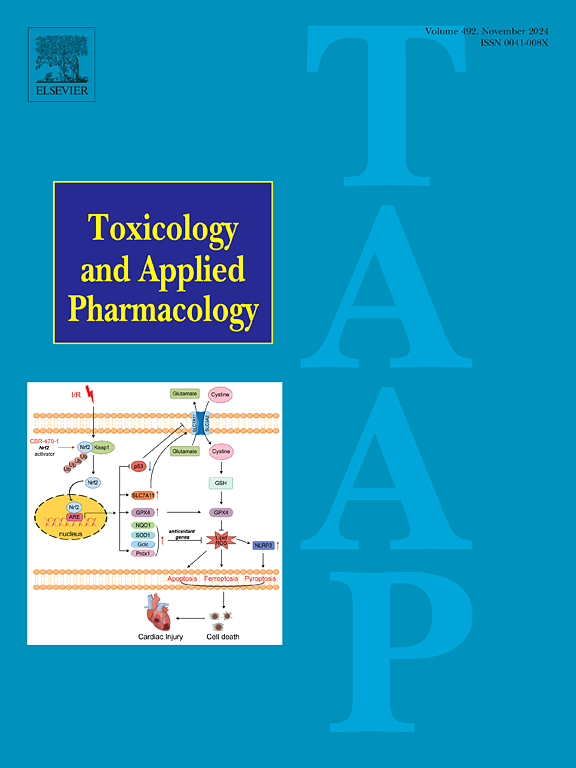Ceritinib (LDK378) inhibits laryngeal squamous cell carcinoma progression via regulating ROS-induced mitochondrial apoptosis and inducing oxidative stress
IF 3.4
3区 医学
Q2 PHARMACOLOGY & PHARMACY
引用次数: 0
Abstract
Laryngeal squamous cell carcinoma (LSCC) is a prevalent malignant tumor of the head and neck with unfavorable outcomes. Ceritinib, an FDA-approved tyrosine kinase inhibitor targeting the insulin-like growth factor 1 receptor (IGF1R), has not been thoroughly explored for its therapeutic potential in LSCC. In this study, we demonstrated that Ceritinib significantly inhibits the growth of LSCC cells (TU686 and AMC-HN8), disrupts oxidative stress homeostasis, and induces mitochondrial-mediated apoptosis. Ceritinib triggered ROS overload, and the apoptotic effects were reversed by N-acetylcysteine, confirming ROS-dependent mitochondrial apoptosis. Transcriptome sequencing and Western blot analysis revealed that Ceritinib suppresses PI3K/Akt signaling to promote apoptosis. Ceritinib triggered mitochondria mediated apoptosis via ROS-PI3K/AKT axis to inhibit the progression of LSCC. Furthermore, using Chou-Talalay's method, we calculated the combination index (CI) for Ceritinib and cisplatin, demonstrating that their combination synergistically suppressed the malignant behavior of LSCC cells, exacerbated mitochondrial dysfunction, and enhanced oxidative stress in vitro. In vivo, Ceritinib (25 mg/kg) alone or in combination with cisplatin (2 mg/kg) significantly inhibited LSCC tumor growth without affecting bodyweight. Overall, our findings highlight that Ceritinib, both as a monotherapy and in combination with cisplatin, effectively inhibits LSCC progression in vitro and in vivo—with the combination more potently promoting apoptosis and suppressing tumor cell proliferation, consistent with our in vitro results—underscoring its potential as a promising therapeutic strategy for LSCC treatment.

Ceritinib (LDK378)通过调节ros诱导的线粒体凋亡和诱导氧化应激来抑制喉鳞癌的进展
喉鳞状细胞癌(喉鳞状细胞癌)是头颈部常见的恶性肿瘤,预后不良。Ceritinib是fda批准的靶向胰岛素样生长因子1受体(IGF1R)的酪氨酸激酶抑制剂,其在LSCC中的治疗潜力尚未得到充分的探索。在这项研究中,我们证明了Ceritinib显著抑制LSCC细胞(TU686和AMC-HN8)的生长,破坏氧化应激稳态,诱导线粒体介导的细胞凋亡。Ceritinib触发ROS过载,n -乙酰半胱氨酸逆转凋亡效应,证实ROS依赖性线粒体凋亡。转录组测序和Western blot分析显示,Ceritinib抑制PI3K/Akt信号通路,促进细胞凋亡。Ceritinib通过ROS-PI3K/AKT轴触发线粒体介导的凋亡,抑制LSCC的进展。此外,我们使用cho - talalay的方法计算了Ceritinib和顺铂的联合指数(CI),表明它们在体外协同抑制LSCC细胞的恶性行为,加重线粒体功能障碍,并增强氧化应激。在体内,Ceritinib (25mg /kg)单独或与顺铂(2mg /kg)联合显著抑制LSCC肿瘤生长,而不影响体重。总的来说,我们的研究结果强调了Ceritinib,无论是单独治疗还是与顺铂联合治疗,在体外和体内都能有效地抑制LSCC的进展-与我们的体外结果一致,联合治疗更有效地促进细胞凋亡和抑制肿瘤细胞增殖-强调了它作为LSCC治疗有希望的治疗策略的潜力。
本文章由计算机程序翻译,如有差异,请以英文原文为准。
求助全文
约1分钟内获得全文
求助全文
来源期刊
CiteScore
6.80
自引率
2.60%
发文量
309
审稿时长
32 days
期刊介绍:
Toxicology and Applied Pharmacology publishes original scientific research of relevance to animals or humans pertaining to the action of chemicals, drugs, or chemically-defined natural products.
Regular articles address mechanistic approaches to physiological, pharmacologic, biochemical, cellular, or molecular understanding of toxicologic/pathologic lesions and to methods used to describe these responses. Safety Science articles address outstanding state-of-the-art preclinical and human translational characterization of drug and chemical safety employing cutting-edge science. Highly significant Regulatory Safety Science articles will also be considered in this category. Papers concerned with alternatives to the use of experimental animals are encouraged.
Short articles report on high impact studies of broad interest to readers of TAAP that would benefit from rapid publication. These articles should contain no more than a combined total of four figures and tables. Authors should include in their cover letter the justification for consideration of their manuscript as a short article.

 求助内容:
求助内容: 应助结果提醒方式:
应助结果提醒方式:


